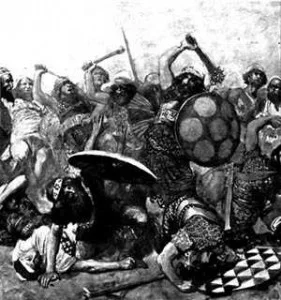[A two for one Card Talk]
However you approach it, the Bible contains a lot of death. A lot of death. Especially the Hebrew Bible/Old Testament as there is the inescapable fact that there were people living in the “promised land” before it was promised. They may not have had an Ark of the Covenant, but they had ancestral graves and children: pasts and futures denied by (supposed) divine decree.
This is something a faithful reader of the Bible must confront. There are numerous ways this has been done, including the all too common, “they all deserved to die” and “the Hebrews massacred, but God didn’t approve of it” positions. We recommend you compare and contrast the opinions of Carol Newsom, Sharon H. Ringe, Paul Copan, Frank Moore Cross Jr., David Noel Freedman, Daniel L Smith-Christopher, and a host of others on this topic: wrestle with this seriously as we have. But also allow us to present the following thought experiment for your consideration:
What if the Deuteronomistic History (Joshua, Judges, Samuel & Kings) was written directly prior and during the events of the Assyrian and Babylonian Exiles? [They were]
What if the writers/editors of these texts composed while suffering at the hands of nations seen as the descendants of the Ammonites, Amorites, Edomites, Moabites, Perizzites (et al): the ancient villains of the Hebrew Bible? [They did]
What if the Torah’s call for holy separation from the people inhabiting “the promised land,” culminated in a militaristic expression to destroy them, regardless of what happen in reality? [The first chapter of Judges tells us that they were not all killed.]
Beyond the practical and spiritual metaphors Christians find in these passages, the implications and benefits of living a holy/separate life which can be gleaned from the story, what if the militaristic expression to utterly destroy all in the land, is really the angst-filled expression of a people staring down the length of an Assyrian and/or Babylonian spear?
Phrased differently: “If we had only killed all of them before, none of this would have happened!”?
The books were written after the events they describe, yet reflect the contemporary mindset and situation of the authors: siege warfare, starvation, poisoned wells, murdered sons and fathers, raped daughters and mothers, the destruction of the Temple, death marches, and displacement in Exile at the hands of Canaanite descendants whose customs and culture they were to have no dealings with. A theology of guilt arises: these troubles come from not being true to YHWH their God. Thus the writers picture a different past:
"Imagine there were no Canaanites. Imagine we had killed them all. No Canaanites = no temptation to follow their ways = no punishment from God for doing so. God wanted us to be separate from them. We should have killed them all. . ."
We propose no further lesson from this thought experiment. Perhaps we should. But we won’t. Not this time. We all go to extremes when we rewrite our personal histories.
But what do we know: we made this game, and you probably think we deserve to go to Hell, just like the Canaanite babies.

